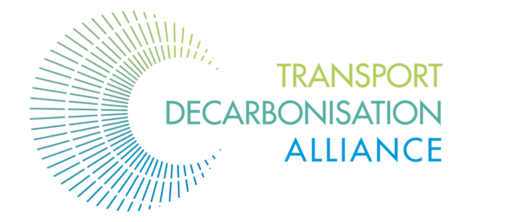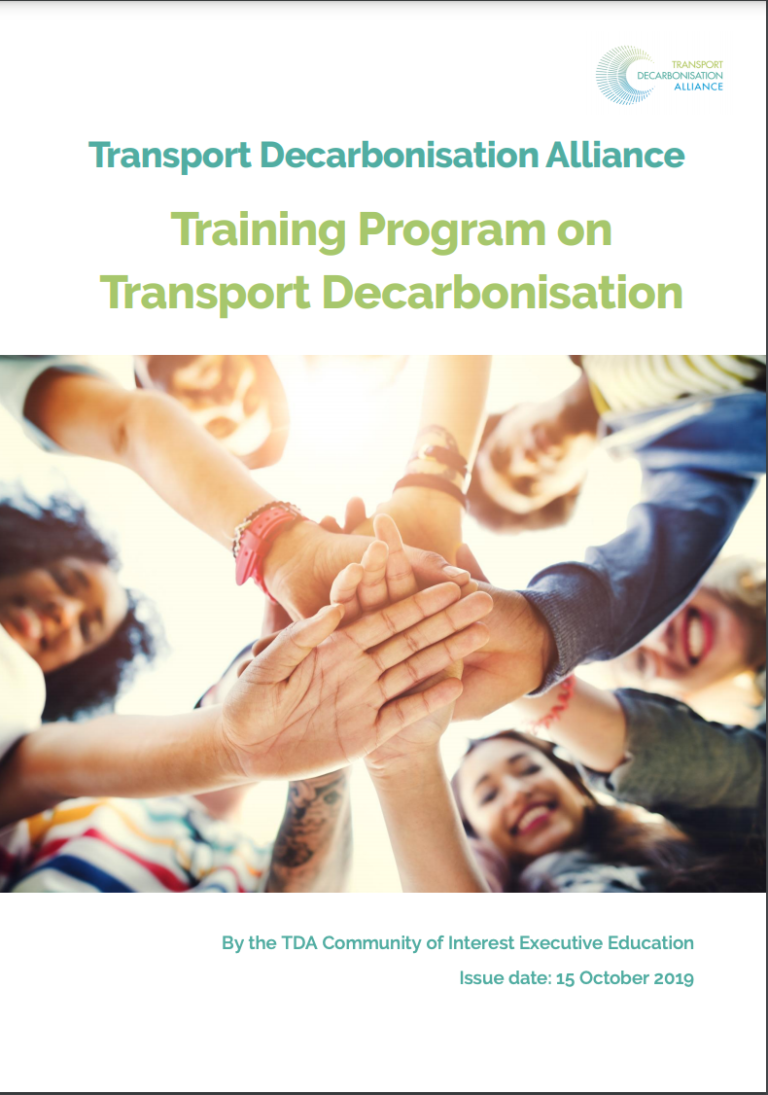EXECUTIVE EDUCATION ON TRANSPORT DECARBONISATION

TRANSPORT MATTERS
Transport is the major sector off track to meet the commitments made at COP21 in 2015, with greenhouse gas (GHG) emissions still rising. The decarbonisation of the entire transport sector needs to accelerate on the path towards net zero-emissions by mid-century. Transport being a cross-cutting activity to the global economy, specific knowledge tools and skills are required by the future leaders so that the economies may incorporate transport decarbonising actions into their business models fostering a decarbonised and resilient transport sector.
IDENTIFIED CHALLENGES
The transition required to decarbonise the transport sector requires a new style of leadership, as stated in the TDA Manifesto. Stakeholders will face new challenges, requiring from professionals new advanced skills which are not fully covered by the classical “silo-type” programs on Transport, Environment, and Finance available from higher education institutions.
Decision makers will face, more and more often, complex challenges. Some typical examples are:
- A company plans to make a strategic investment on logistics (fleet & energy use);
- A city hall wants to develop a low-carbon strategy for mobility;
- A transport ministry wants to pass a law on shared mobility;
- A national government wants to evaluate a new model of mobility taxation;
- A bank wants to prepare a new funding offer for green transport.
Transition is possible through a virtuous combination of contributions from:
- Private sector (innovation-driven)
- Local governments (economy & quality of life-driven)
- National governments (public interest-driven)
THE OPPORTUNITY
There is a need to develop a specific offer on executive education, addressed at active professionals and graduate students who want to become leaders in a field that, in the short term, will be ubiquitous across all economic sectors, anywhere in the world.
TDA is in an excellent position to take forward this opportunity as it includes the right combination of expertise, coming from national governments, cities and companies. TDA members operate on both the demand and the solutions sides.
THE OBJECTIVE
In association with reference Academia/Research institutions, the TDA will develop a “TDA Executive Curriculum on Transport Decarbonisation”, which will be deployed and replicated in different geographies, partnering with world class schools, thus maximising the impact.
Additionally, this is a powerful vehicle for the dissemination of the TDA principles of transport decarbonisation, especially in regions like Africa, Asia and South America, where there is a real awareness of the need for advanced executive education in the transportation sector.
THE COMMUNITY OF INTEREST MANDATE
The CoI includes interested TDA members and an Academic Expert Group. The CoI members will actively participate in the CoI thus contributing to build the TDA Transport Decarbonisation Program curriculum and related syllabus.
The Academic Expert Group will have a consultancy role to provide feedback, comments and suggestions on the Executive Program curriculum, syllabus and future content. The academic Expert Group will include universities from Europe, Americas and Asia, thus providing a global perspective to the Executive Education Program. The Academic Experts are invited by allocated CoI members to participate.
The CoI is open for all TDA members that raise their participation interest. If and when required, the CoI will call upon any of the TDA supporting organisations for specific contributions to add value the Executive Education Program.
COI MANAGEMENT
The CoI on Executive Education on Transport Decarbonisation is led by Portugal and it should last for three months. The deliverable will be a Final Report with the “TDA Executive Curriculum on Transport Decarbonisation” including course syllabus, requirements, duration, and potential Academic partnerships.
The CoI started in March and the syllabus was released in October 2019.
CoI milestones include:
- Program Modules definition
- Program Modules’ Syllabus definition
- Definition of Deployment options and Alumni Network actions
- Assessment of the Program by the Academic Expert Group
- Deployment test with one University and (to be identified) teachers and TDA experts
- Deployment worldwide to interested academic organisations and world class schools
TRAINING PROGRAM ON TRANSPORT DECARBONISATION
The Training Program curriculum was developed by the TDA CoI with the kind support and assessment of several universities in Europe, USA and Asia. This curriculum content is to be detailed by each one of the universities adopting the TDA Training Program. The TDA provides support and teaching experts on a case by case situation.
1) Policy framework for transport and climate change
2) Urban multimodal mobility I (overview)
3) Urban multimodal mobility II (public transport)
4) Urban multimodal mobility III (walking and cycling)
5) Urban multimodal mobility IV (new mobility systems)
6) Low carbon mobility for low density and rural areas
7) Decarbonised freight transport and supply chain
8) Renewable energy for transport
9) Management of electric mobility
10) Rethinking your business approach & paper development
The TDA Training program basis was structured in a blended online / onsite mode. It is based on nine online 3-hour modules (with extra learning time) and one onsite one-week module, estimating a total of 75 hours of work load. You can access each module as well as an introduction here:
TDA contact point for the CoI Executive Education:
Portugal – Marco Rebelo
Director for International Relations
Ministry for Environment and Climate Action of Portugal
Phone: +351 213 231 514
Email: marco.rebelo@sg.mate.gov.pt

